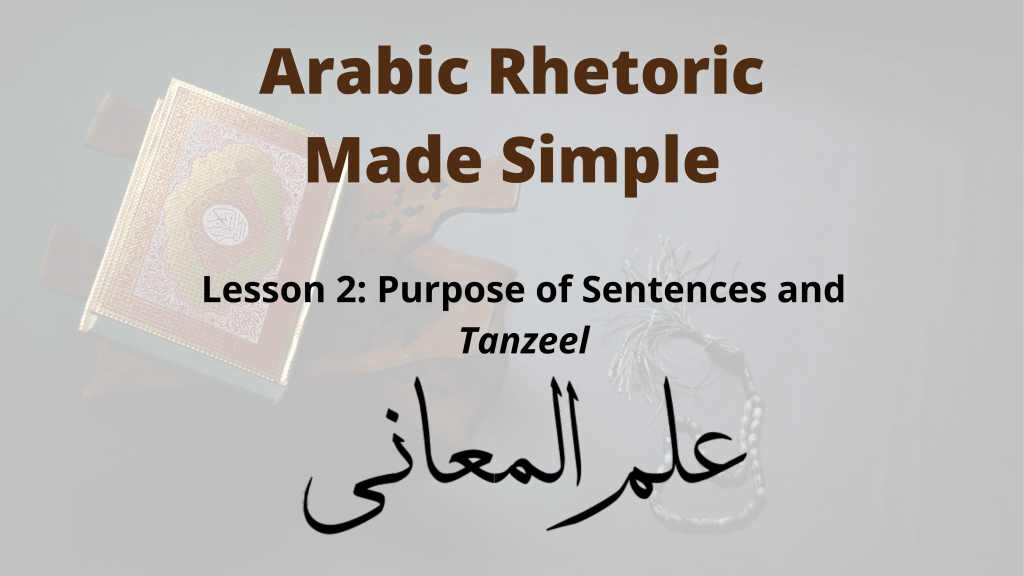
In today’s lesson on ilm ul-ma’aani we are going to talk about what you should consider when creating a sentence in Arabic. We are going to discuss the purpose of your sentence.
First of all, there are 2 types of sentences:
- Informative sentences
- Non-informative sentences
Informative sentences are where you are conveying some information.
Non-informative sentences are where you are not conveying any information. Things like questions, commands, when you are calling someone and so on and so forth.
There is a little trick where you can tell whether your sentence is informative or non-informative. Most of the time it is quite obvious. There is a little test you can put against the sentence.
If someone speaks a sentence, you just tell them “you’re lying!”. If that makes sense it’s an informative sentence. If it doesn’t make sense it’s a non-informative sentence.
If I say “I’m 24 years old”, and you say “you’re lying!”, then that makes sense.
But if I say “how old are you?”, and you tell me “you’re lying!”, that doesn’t make too much sense.
If I say “please sit down”, and you tell me “you’re lying!”, again that doesn’t make sense. So these are non-informative sentences.
When it comes to informative sentences, we are going to be talking about the purposes of these.
When it comes to non-informative sentences, we are not going to be talking too much about the purpose of these because it is quite obvious. You are going to ask a question because you want an answer. You are going to give a command because you want somebody to do something. You are going to call somebody because you want them to come to you, etc.
Table of Contents
The Purposes Behind Informative Sentences
There are primary purposes and there are secondary purposes.
Let’s talk about the primary purposes first. There are two of them:
- Give somebody new information, whether they already know it or they don’t already know it. The point is your intention is to give them some “new information”.
- To tell them or show them that you know the information you are telling them. If you’re giving them that information then you know it too, unless you are talking in your sleep or something.
When you speak an informative sentence, either:
- both of these purposes will come into play or
- just the second one.
Examples of Informative Sentences
Let’s give an example where both of these purposes come into play. Imagine a teacher is standing in front of her class and she tells them “You guys did really well in the test yesterday.” Some of them may already know that, some of them may not. It doesn’t matter. The point is that she is saying this because she wants to convey some new information to them. The first purpose comes into effect.
Now the second purpose also comes into effect. She is also conveying the fact that she knows they did well in the test, otherwise how would she speak that sentence. Number 2 always comes into play. It goes without saying.
Now, let’s take an example of where only the second purpose is intended.
Let’s say every day when the bell rings the teacher comes into class, she doesn’t even look at her student, she goes to the chalkboard and starts writing. From the beginning of the class all the way until the end, all she does is write on the chalkboard and doesn’t even look behind her. The class could be empty for all she knows. When the bell rings everyone gathers their books and then they go.
One day, a certain student comes in half way through the class, really quietly makes his way to his desk and takes out his books, so the teacher or anybody won’t notice. At the end of this class when the bell rings and everyone is gathering their books and leaving, she turns to that student and says “you were late!” Now, what is her purpose? Is she trying to convey new information to him? No, because he knows he was late. She is trying to tell him that she also knows. Even though she never turned around to look at the class, she knows he was late. That is what she is trying to convey to him.
Qur’anic Examples
Let’s take a look at examples of these in the Qur’an.
For the first example where both purposes are coming into effect. You are conveying new information and you are conveying the fact that you are privy to that information.
The example is the following verse from the Qur’an:

Allah is telling this to the believers that when the hypocrites are with you, they are pretending to be with you but when they go with their real friends, they say that we were just mocking them.
So, is the first purpose coming into effect?
Yes, it is. Allah is giving the believers some information they may not have known.
Is the second purpose coming into effect?
Yes, it is. The second purpose always comes into effect. Allah is showing that He also knows that information. Of course he does! Allah knows everything. But still that purpose is coming into play.
Now, let’s go to the second example where only the second purpose comes into play. To do this we are going to use this very same verse of the Qur’an.
Imagine a hypocrite listening to this verse now. What goes through his mind? Allah is telling the believers that when these hypocrites come to you, they say “we believe”, but when they go back to their real friends they say “we don’t really believe, we were just mocking”.
Is Allah expressing new information to these hypocrites? No, He’s not. They know what they are doing. Here the second purpose comes into play. He [Allah] is showing that Allah, His Prophet (peace be upon him) and the believers know this information.
That is very interesting! The same verse can be used for both examples, which just goes to show that each ayah of the Qur’aan has so many different meanings and is so impactful in so many different ways to so many different people at so many different levels.
Those were the two primary purposes of speaking an informative sentence. Either both of them will come into effect or only the second one.
There are also secondary purposes, e.g. expressing grief or disappointment.
A non-Qur’anic Example
Let’s take the example of the teacher again. Let’s say the teacher is sitting at her desk and looking at her class. Half way through the class, Bobby walks in and he says “sorry miss”, she says, “you’re late!”.
What is the purpose of this? Is it any of the primary purposes? No, because first of all she is not trying to give him new information because he knows that he is late. She is not trying to show that she knows, that she is privy to that fact. He is looking at her, she is looking at him, they both know that they both know. It is not any of the primary purposes. The reason she says “you’re late!” is to express her disappointment. Maybe he’s perpetually late. This comes under the secondary purposes. In fact, expressing any of these emotions, whether its grief and disappointment, or happiness or any of these other emotions, then this comes under the secondary purposes. And there are whole lists of emotions that you can express.
Another Qur’anic Example
A second example from the Qur’an.

The mother of Maryam (peace be upon her) had wanted a child for a very long time and she wasn’t getting one. Then she made a vow to Allah that if I do have a child, I will devote him to Your worship. He will pray in the masjid, he will fast and basically pray all day. I just want a child. When Allah gave her a child, it wasn’t the son that she expected. It was actually a daughter. Daughters didn’t stay in the masjid at that time. So, when she gave birth to the daughter, she said the above verse.
What is the purpose here? Is it to give new information? No, you can’t give any new information to Allah, He knows everything. Is it to show that she knows she gave birth to a child? No, Allah knows that she knows.
It is one of the secondary reasons, it is to express grief in this case. She wanted a son, and she got a daughter, so now she is expressing grief through this informative sentence.
Tanzeel
Let’s get into something really interesting!
Let me give you a sentence where it seems that neither any of the primary purposes are coming into effect, nor any of the secondary purposes coming into effect.
Here is the scenario. You go up to a scholar of Islam (an alim) who doesn’t pray salah and you tell him, “salah is wajib” (i.e. prayer is mandatory).
What is going on here?
Is the point of your informative sentence any of the two primary purposes? No. because you are not giving him new information. He is a scholar; he already knows prayer is mandatory. Are you trying to tell him that you know prayer is mandatory? No, because every Muslim knows that prayer is mandatory, and every Muslim knows that every other Muslim knows that prayer is mandatory. It is very common knowledge. It is not any of the primary reasons.
Is it one of the secondary reasons? Are you expressing some sort of emotion, e.g. grief maybe or disappointment that this person is a scholar, yet he is not praying? So, you go up to him and you say to him that prayer is mandatory! Maybe, but not really. You wouldn’t do that. That is not how you express grief over that situation.
So seemingly, it doesn’t seem that any of the two primary purposes are taking effect nor any of the secondary purposes. It has to be one of these. Either both primary purposes or just the second one, or at least some of the secondary purposes. You cannot escape that, yet none of them seem to be taking effect.
So what is going on? This guy is a scholar, and he knows that prayer is mandatory, yet he is not acting upon his knowledge. I.e. he might as well not have that knowledge in the first place. He is not deriving any benefit from that knowledge. He is just as good as someone who doesn’t have that knowledge. You are doing something called tanzeel. You are bringing him down from the level of a scholar to the level of a non-scholar, and then speaking to him accordingly.
That is pretty awesome!
Let me say that again. He is a scholar, and he knows that he should pray. But he is not praying. He is not using his knowledge. Someone who doesn’t use their knowledge is just as good as someone who doesn’t have that knowledge to begin with. They might as well not have that knowledge. Under that assumption you speak to them accordingly. You speak to them as though they don’t have that knowledge and that is why you say “prayer is mandatory” to them. Even though they already know that technically.
A Qur’anic Example of Tanzeel

Allah is talking about a people who used to engage in magic, which of course is a sin. He says about them “And they knew well that whoever bought magic had no share in the hereafter”. i.e. they knew magic was a sin.
“What a vile thing for which they sold their souls” I.e. they knew it was wrong but they did it anyway.
And, finally “if only they knew!”.
Look what’s going on here.
In the beginning Allah says that they know magic is a sin. Then He says, but they engaged in it anyway. Then He says at the end “If only they knew””.
So at the top you have “they know”, at the bottom you have “if only they knew”
Allah is saying that they knew it, but they did it anyway. So, they may as well have not known it in the first place. Accordingly, Allah is speaking about them and says “if only they knew!”, as if they didn’t know.
Here is another example that shows this tanzeel business; bringing someone from the level of someone who knows to that of someone who doesn’t know is not necessarily in the case of knowledge. It could also be in many other scenarios. It could be in the case of the existence of something, bringing it down to its non-existence.
Allah says to the Prophet (peace be upon him):

This is talking about when the prophet (peace be upon him) picked up some sand and threw it and it landed in the eyes of the disbelievers that they were engaged in battle with.
Allah says that you threw, but you didn’t throw. It means that you’re throwing did exist, but it may as well not have existed, because it was Allah who took the sand and brought it to the eyes of the disbelievers. He could have done it by using the wind or he could have done it without the use of any asbaab at all. This is tanzeel. Bringing something down from one level to another and talking about that thing or to that thing accordingly.
- Proceed to next lesson: Emphasis in Arabic Sentences
- Return to index page: Intro to Ilm Ul-Ma’ani
- Start free lessons: Sign Up for Free Mini-class